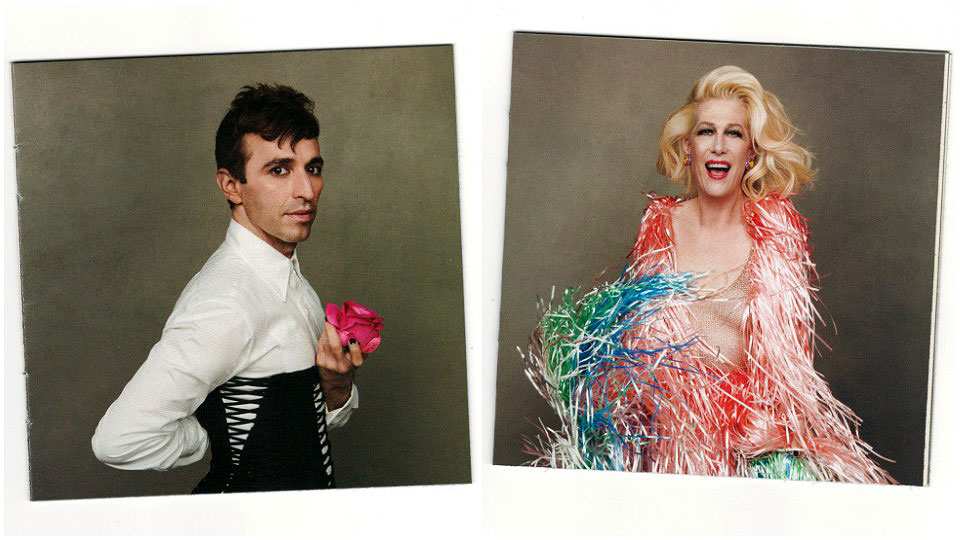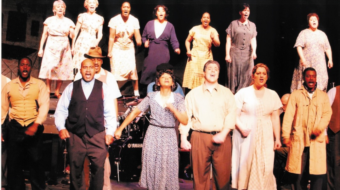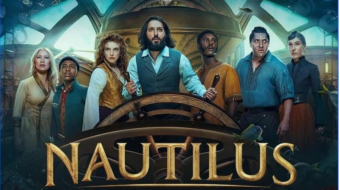
The highly urban venues of the opera house and the cabaret have always drawn a high quota of queer people. There’s something of the “I Am What I Am”—the hit song from La Cage aux Folles—in the over-the-top expressivity in both genres, the longing and despair over an intimate blue cocktail, the flamboyant exuberance of a full-throated stage production with powerhouse singers, chorus, corps de ballet, staging, scenery, costumes, lights, and a big bold story told in music.
World-renowned singers Anthony Roth Costanzo, an openly gay countertenor at the top of his career, and trans performance artist Justin Vivian Bond, who held out for decades at Joeʼs Pub at New York City’s Public Theater, have joined up to share their queer identities through unique interpretations of classical music, pop song, cabaret and salon numbers, and establishing a range of musical, thematic and emotional points of intersection among them all. Think Freddie Mercury joining in rapturous song with Montserrat Caballé at the 1992 Barcelona Olympics or comedian Carol Burnett with Beverly Sills on The Ed Sullivan Show.
In these media, the ordinary individual—the viewer, the listener, the reader—who has otherwise made no great mark in the world can find the words and the harmonies they themselves are incapable of saying. Of their live staging of this material in the the fall of 2021 at St Ann’s Warehouse, W Magazine wrote that it was “a glittering, disarming, poignant, funny, occasionally fully spontaneous reminder of why theater exists.”
 To showcase the solo voices, each singer has their own track. ARC performs Franz Liszt’s “Über allen Gipfeln ist Ruh” set to a poem by Goethe that Henry Wadsworth Longfellow translated as “O’er all the hilltops is quiet now”: “In all the treetops/ Hearest thou/ Hardly a breath;/ The birds are asleep in the trees:/ Wait, soon like these/ Thou too shalt rest.” Perhaps, amidst all the gaiety of the album, ARC wished to introduce a quiet, solemn note (untranslated, by the way) to recall those who are “resting” now and as a memento mori for those of us still kicking. What stood out for this listener is the German word “Vögelein,” which literally means “little birds.” The closely related Yiddish word “feygelakh” is slang for “faggots” (both pejoratively and affectionately, depending), which any queer living in New York City surely knows. That may account, in part at least, for ARC’s choice of this song.
To showcase the solo voices, each singer has their own track. ARC performs Franz Liszt’s “Über allen Gipfeln ist Ruh” set to a poem by Goethe that Henry Wadsworth Longfellow translated as “O’er all the hilltops is quiet now”: “In all the treetops/ Hearest thou/ Hardly a breath;/ The birds are asleep in the trees:/ Wait, soon like these/ Thou too shalt rest.” Perhaps, amidst all the gaiety of the album, ARC wished to introduce a quiet, solemn note (untranslated, by the way) to recall those who are “resting” now and as a memento mori for those of us still kicking. What stood out for this listener is the German word “Vögelein,” which literally means “little birds.” The closely related Yiddish word “feygelakh” is slang for “faggots” (both pejoratively and affectionately, depending), which any queer living in New York City surely knows. That may account, in part at least, for ARC’s choice of this song.
Mx. JVB’s solo follows, a more obvious LGBTQ selection, a combo of rainbow songs, “I’m Always Chasing Rainbows” by Harry Carroll and Joseph McCarthy, and “Rainbow Sleeves” by Tom Waits. The baritone with the prominent vibrato waits “to find a little bluebird in vain”—those birds again! reminding us of the bluebird in “Over the Rainbow”—and imagines, in the Tom Waits song, “places where you’d never get the blues.” “A heart that’s been broken,” the poet assures us, “will be stronger when it mends.”
All the other numbers feature both voices together in the distinct vocal ranges and genres one might expect from them, though with an enchanting twining where both sound necessary and inevitable and often surprising.
The opening number is the famous Joseph Kosma song to Jacques Prévert’s lyric, “Autumn Leaves,” remade by Johnny Mercer. While not exactly a somber song, it properly alerts the listener that they are in for a serious musical experience, not simply a gay romp. It’s followed by something totally different, Liam Sternberg’s “Walk Like an Egyptian,” which The Bangles sang in 1987, giving rise to an original Orientalist dance phenomenon, mashed up with Akhnaten’s “Hymn to the Sun” from the Philip Glass opera that ARC starred in (and will again this season at the Met) as the pharaoh who adopted the philosophy of one god.
Which might be a good time to say that all but two of the 12 tracks on the album were arranged by composer Nico Muhly, whose operas Two Boys and Marnie have both been produced at the Metropolitan Opera to great acclaim. He makes a little multi-genre jewel box of each number, keeping it all sparkling and wondrous.
Another successful combo number is “Deh placatevi con me” from Gluck’s opera Orfeo e Euridice. Orpheus is, of course, the great musician artist of Greek myth who loses his bride Euridice and spends the rest of his life inconsolably creating art as a release for his sorrow. This is something all of us who survived the AIDS epidemic know too, too well. Paired with this aria is Peter Gabriel’s song “Don’t Give Up,” a kind of musical counterpart to the “It Gets Better” campaign encouraging youngsters with sexual identity questions and fears to hold out, “because you have friends” and “you’re not beaten yet,” “you’re not the only one,” you have “no reason to be ashamed,” and you can “be proud of who you are.” As we age, we don’t always remember that a lot of young people around the world struggle every day with these issues. And as fascist forces continue to attack the LGBTQ community through legal restrictions and school and library censorship, affirmative support is ever more needed.
In a track called “Two Charming Fairies,” the singers join Henry Purcell’s “One Charming Night” and the classic gay music hall number “There Are Faeries at the Bottom of Our Garden,” delivered in a kind of arch Sprechstimme as a musicalized recitation by JVB.
The out-and-out fabulousness of a positive queerness is enhanced in Stephen Merritt’s “Two Meadowlarks”—more feygelakh!—that references famous watering holes of NYC such as JVB’s hangout Joe’s Pub and the Rainbow Room. But both friends will eventually meet later at The Eagle, a leather bar known for its rough and dangerous S&M image—though everyone knows that many a queen loves to dress up!
Another very successful mashup is the famous “Dido’s Lament” from Purcell’s opera Dido and Aeneas. It’s her death aria, “When I am laid (in earth),” which has long been subject of great humor not only in the queer community but anywhere frank sexuality is celebrated (though I can’t vouch that in Purcell’s time the term had the same valence). The most memorable line in the aria is her earnest appeal, “Remember me!” This may have a special resonance for LGBTQ folk, many of whom do not have children to remember them. Who indeed will remember us after we’re laid (in earth)? The mashup is with the romantic song “White Flag” by—wait for it—Dido Armstrong: “I’m in love and always will be.” I would have enjoyed being in the room with these artists as they were battering around what songs go together, what both famous and obscure numbers out of the whole repertory of opera and song they could smash together to say something fresh. This cut ends with the musical ensemble recapitulating the famous notes of the aria “Laugh, clown!” from Leoncavallo’s verismo opera I Pagliacci that speaks of the often sad inner life of those, like Rigoletto or perhaps any artist, who entertain and divert. (See “talent to amuse” under Noël Coward.)
“Everybody is a star,” they sing in “Stars” by Patrick Cowley to a heavenly disco beat that ethereally recalls Philip Glass’s hypnotic work. Yet we also know, in the following standard by Dave Dreyer, Billy Rose, and Al Jolson, that “Me and My Shadow” “got no one to tell our troubles to.” It’s almost as though the artists are reaching out to their listeners, whoever and wherever they are, to say, “We hear you, we know how you feel, we’ve been there too.”
We are dealing here with sophisticated artists of vast professional experience and accomplishment who are sensitive to “the promise of living” (to cite Aaron Copland, another gay artist) in all its complexity—joy and ecstasy, tragedy, loss, and disappointment, sometimes all blended together, or shall I say, mashed up into one unwieldy package. But in the end, they offer the optimism that comes from trying something new and different, the hope that we will survive it and come out stronger, the confidence to believe in ourselves, and the encouragement to “give love one more chance.” There are so many embedded messages and subversive passwords conveyed in this album, yet it comes across as diamantine artfulness, melding high culture to counterculture, an insider-outsider musical historical lesson that is often hysterical in the camp way.
For more information on Justin Vivian Bond, see here; and for more on Anthony Roth Costanzo, see here.
Only an Octave Apart
Anthony Roth Costanzo and Justin Vivian Bond
Decca Gold B0034670-02, released January 28, 2022










